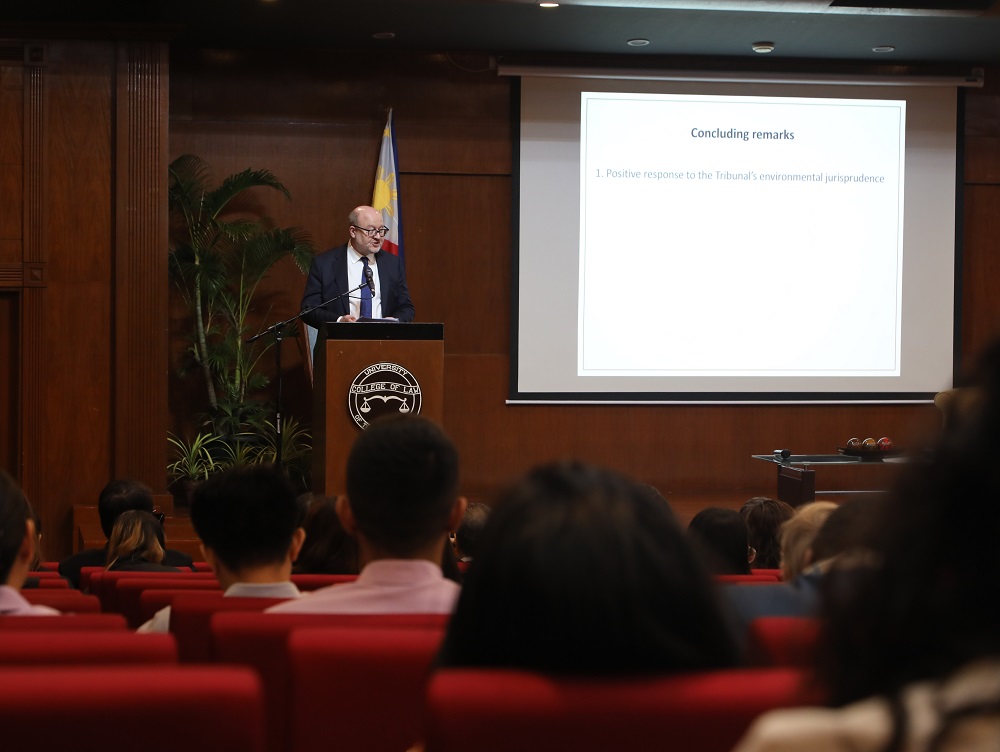
November 27, 2024 Wednesday

President Tomas Heidar of the International Tribunal for the Law of the Sea (ITLOS) delivers a lecture on The Role of ITLOS Jurisprudence in International Environmental Law.
The Climate Change Commission (CCC) highlighted the need for stronger international cooperation to combat climate-related threats to oceans, emphasizing the role of international legal frameworks in driving climate action. This came with the visit of H.E. Tomas Haukur Heidar, President of the International Tribunal for the Law of the Sea (ITLOS), to the Philippines.
Heidar delivered a series of high-level lectures at the University of the Philippines (UP), the Asian Institute of Management for the Office of the Solicitor General, and the Department of Foreign Affairs (DFA). These engagements aimed to deepen the understanding of the international legal framework in relation to climate change and its global impacts.
Heidar’s historic visit to the Philippines, the first to be undertaken by an ITLOS President, highlighted the need for multistakeholder support for a rules-based ocean regime to resolve disputes, clarify sovereign commitments under international frameworks, and identify areas for cooperation towards a just, peaceful, climate-resilient future for all.
This opinion emphasized the need for States to protect the oceans from climate-related threats such as sea level rise and ocean acidification. For the Philippines, with one of the world’s longest coastlines and thriving coral ecosystems within the Coral Triangle, these threats pose significant risks to marine biodiversity, fisheries, and coastal economies.
At the University of the Philippines, Heidar delivered a lecture titled "Intersections between the Law of the Sea and International Environmental Law: The Role of ITLOS in Climate Action." He emphasized the importance of legal frameworks in driving climate action and ocean protection.
“Hopefully, this particular Advisory Opinion will improve cooperation between states—it’s a key in climate change because you will not deal with climate change unilaterally. You need to do it together,” Heidar said.
Given the Philippines’ vulnerability to climate impacts and its position as an active actor in various international legal frameworks such as the Loss and Damage Board, the lecture was an important step in the Philippines’ ongoing commitment to address climate change through international discussions on marine protection and climate governance.
The CCC is committed to ensure that the Philippines remains a key player in shaping global climate policy, particularly in advocating for the rights of vulnerable island states and coastal communities that are disproportionately impacted by climate change.
“The ITLOS opinion aligns with the Philippines’ National Adaptation Plan and defines our State’s promises under UNCLOS, the UNFCCC and its Paris Agreement, and other relevant international legal instruments,” said Secretary Robert E.A. Borje, CCC Vice Chairperson and Executive Director.
“As a responsible member of the international community, the Philippines relies on international law to clarify responsibilities and commitments to advance climate action, including on greenhouse gas emissions and marine pollution. This lecture is crucial for a better understanding of the nexus between UNCLOS and UNFCCC," he added.
Heidar’s visit also serves as a reminder of the global responsibility to protect the planet's oceans and ensure that international law supports climate resilience.
“The Philippines will continue to work with other states in contributing to the ongoing work premised on the interconnectedness of a healthy ocean, climate change, and the human rights of all. Guided by, among others, the landmark ITLOS Advisory Opinion, climate change is the greatest global governance challenge of our generation,” Department of Environment and Natural Resources Secretary Maria Antonia Yulo Loyzaga stated.
The CCC continues to work closely with academic institutions, international bodies, and stakeholders to ensure the Philippines remains at the forefront of climate and ocean governance.
For more information and updates, visit www.climate.gov.ph or follow @CCCPhl on Facebook and Instagram.